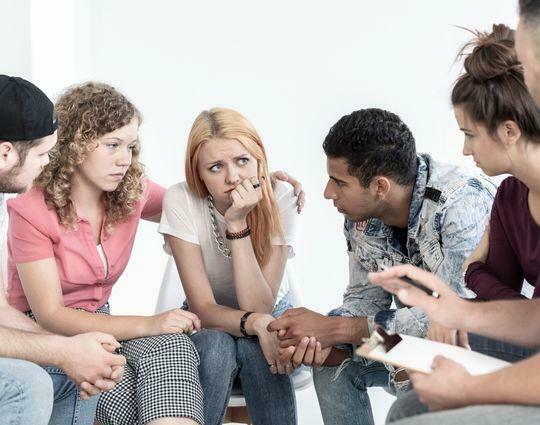Immediate Availability - Open 7 days a week - day, evening and weekend appointments
Immediate Availability - Open 7 days a week - day, evening and weekend appointments

Many of us have wished they had stayed at home instead of gone to that party or had to take a few deep breaths before greeting that aunt or did our best to control our shaking hands for that job interview.
This type of social anxiety is a normal part of daily life and can often give us moments to self-reflect on what is making us feel anxious.
However, there are times where this anxiety can stop us going out at all, or not being able to have a job because we never went to the interview. This could suggest that normal social anxiety has become Social Anxiety Disorder.
Social Anxiety Disorder is a recognized mental health difficulty that can be diagnosed by a psychological therapist and an intervention plan to support you is put into place.
Before you read any further – if you think you may experience Social Anxiety Disorder, remember that you can manage it and there are counselling services in Calgary to help you. Congratulations for looking into ways to help yourself.
For social anxiety to be classified as a Social Anxiety Disorder certain criteria must be met. One of the key criteria is how much the anxiety affects your functioning. Social Anxiety Disorder would prevent you from meeting needs and wants in different areas of your life, like work/school, friendships/relationships, home life, etc.
Someone who experiences Social Anxiety Disorder will feel extreme fear and worry over social situations. Even situations that they might really want to attend. This leads to them avoiding the situation because the distress that the fear and worry cause becomes unbearable.
The fear and worry usually focus around being rejected or humiliated. With Social Anxiety Disorder a person cannot ‘warm up’ to a situation as the fear and worry persist throughout the interactions, therefore making avoidance the preferred coping strategy.
Although the fear and worry are disproportionate to the situation, it is very real to the person feeling it and this must be acknowledged.
Social Anxiety Disorder is often experienced from a young age and can receive support from counselling services from the age of 8 years.
Social Anxiety Disorder will only be diagnosed if you have experienced this type of fear and worry for longer than 6 months.
Social Anxiety Disorder can be felt physically as:
These physical symptoms can get worse the closer a social engagement gets or the more you think about the worry. These symptoms can also appear after a social engagement because you may ruminate over the interactions you had.
Emotional and behavioral symptoms could be:
Some of the above-mentioned symptoms can be felt under normal circumstances or if you are feeling shy. If you feel some of these things it does not necessarily mean you have Social Anxiety Disorder
The next big question then is, how do I know if I have Social Anxiety Disorder or if I am shy?
It is commonly accepted that shyness is a personality trait and may occur at certain times or experiences of a person’s life.
The way a person feels when they are shy may seem very similar to the symptoms we have discussed.
The best way to determine whether you experience Social Anxiety Disorder or shyness is to look at the frequency and the intensity of these feelings. Here are some questions you can ask yourself:
If you have answered ‘Yes’ to most of these questions it is unlikely that you are experiencing shyness, rather it would be a good idea to contact a psychological therapist to explore Social Anxiety Disorder.
Experiencing social anxiety and shyness is a common, and at times normal phenomenon. When it becomes something that causes distress it is helpful to have some tricks to ease this distress.
Using these tricks daily can help you build up resilience to the distress and build your own confidence in yourself!
Talking with a therapist can help you overcome social anxiety, especially if you feel the intensity of your social anxiety may suggest Social Anxiety Disorder.
One of the helpful forms of therapy for social anxiety is Acceptance and Commitment Therapy. This form of therapy acknowledges the anxiety is part of us and works towards building self-esteem and coping strategies to work with who we are.
Our thoughts can sometimes be our own worst enemy and encourage us to believe the worst of ourselves or a situation. If we are able to pause and ask, “How can I challenge this thought?” we may be surprised at the variety of different perspectives we can come up with.
By shifting the hold that negativity (which is a survival tactic) has on us we can reframe the way we see situations in front of us.
Our breath has a powerful influence over our emotions and how we physically feel. You can try an experiment – for a few seconds breathe very rapidly – notice how your body feels, notice how you feel emotionally after this.
Most people report feeling slightly nauseous and panicked after breathing like this, some even want to cry. Many people experience this rapid breathing when they feel anxious.
We can counteract this by slowing the breath. Try breathing in for a count of 4, holding your breath for a count of 4, and breathing out for a count of 6. A longer exhale helps to calm the body.
Caffeine and alcohol will affect how we feel, either by stimulating or ‘picking us up’, or by suppressing or ‘chilling us out’. These substance induced states removes the control we have over ourselves, instead of the commonly thought myth that they support coping strategies.
There could be a temptation to counteract shyness with a few drinks to ‘loosen up’, however, this does not remove the shyness and next time it will be difficult to cope in a social situation without alcohol. This can lead to substance misuse and addiction.
Remembering that you are not alone is important. It may feel as though staying alone with decrease the anxiety, yet this is not the case. If you experience Social Anxiety Disorder, then your thoughts will be racing and causing anxiety even if you are alone.
Reaching out to a friend gains support and comfort. Try to explain to your friend what you would need from them beforehand. Then they can offer you the exact support you need when you reach out.
Asking a friend to help you overcome shyness when you meet new people for the first time by including you in the conversation is a great strategy to ease into new interactions.
You may also consider looking for a support group for Social Anxiety Disorder.
Making any change takes effort. Working against anxiety or shyness will take more effort. With this in mind you need to find ways to motivate yourself to put in the effort. What about using rewards?
We all like to receive recognition and rewards for our effort – so give these to yourself!
Do you enjoy yoga? Take an online yoga class to celebrate a week at work.
Go out with friends and treat yourself to your favorite meal for being there.
Have a hot bath or shower with good music playing to relax after that stressful business meeting that you presented at.
There are many ways you can recognize each victory!
We all love to have fun, why not bring it in to help support our anxiety? Think about an activity you enjoy and stage a social interaction doing that activity. You will have fun and ease yourself into a social interaction.
Look for moments to laugh, use your sense of humor to help you see those different perspectives. Instead of panicking about what could go wrong, why not laugh at what might go right?
Many of these tips might be making you think, “Yeah right, I can’t see myself doing that.”
It is okay if you feel this way because these tips take you out of your comfort zone. Being out of our comfort zones is where we learn, grow, and change. When overcoming social anxiety and shyness we do need all three of these things.
Always remember to be kind to yourself when you are exploring that space outside your comfort zone.
Experiencing social anxiety, whether as shyness or Social Anxiety Disorder, can be distressing. Seeking out counselling services if you feel that you may experience Social Anxiety Disorder is brave and will get you the assistance you need to continue living a full life.
Social anxiety and shyness can be managed. If you need assistance, contact us at One Life Counselling and Coaching.
